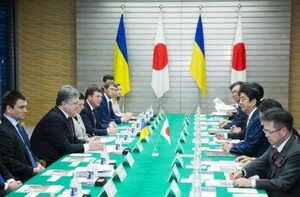
Oleksiy Volovych
April 5-7, 2016, immediately after the end of his visit to the United States, the President of Ukraine P. Poroshenko made an official visit to Japan at the invitation of Prime Minister Shinzo Abe, who in June last year for the first time in the history of the Ukrainian-Japanese relations visited Ukraine. During that visit, Shinzo Abe, spoke on respect for the sovereignty and territorial integrity of Ukraine, on the unacceptability of using force to resolve the situation in the Donbas and on giving Kyiv loan guarantees in the amount of 1.5 billion US dollars.
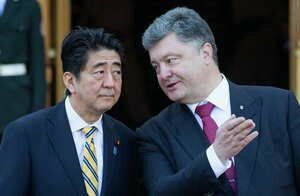 During the talks, attention was paid to the Ukrainian-Japanese cooperation in the sphere of “green” investments, in accordance with the obligations of the two countries under the Kyoto Protocol. Japan also gave Ukrainian law enforcement agencies about 1.5 thousand vehicles with ecological engines. Also were discussed the issues of exchange of experience in overcoming the consequences of nuclear power plant accidents in both the countries. While in Kyiv, Shinzo Abe promised to actively promote a peaceful and diplomatic solution to the conflict in the Donbas, during Japan's presidency in the “Group of Seven” in 2016.
During the talks, attention was paid to the Ukrainian-Japanese cooperation in the sphere of “green” investments, in accordance with the obligations of the two countries under the Kyoto Protocol. Japan also gave Ukrainian law enforcement agencies about 1.5 thousand vehicles with ecological engines. Also were discussed the issues of exchange of experience in overcoming the consequences of nuclear power plant accidents in both the countries. While in Kyiv, Shinzo Abe promised to actively promote a peaceful and diplomatic solution to the conflict in the Donbas, during Japan's presidency in the “Group of Seven” in 2016.
Japan Is a Unique Country
Japan is the last country in the world to have formally retained the status of an Empire. The current Emperor Akihito is the 125th direct descendant of the first Emperor Jimmu, who founded Japan 2726 ago — in 711 BC. Japan's territory is almost half the territory of Ukraine — 366 845 square kilometers, of which only 45 000 square kilometers — agricultural land. 70 % of the country are mountains covered with forests. Japan consists of approximately 6800 islands. The four main islands — Honshu, Kyushu, Shikoku and Hokkaido — account for 97 % of the total area of Japan. There are more than 200 volcanoes in Japan, and the highest active volcano is Mount Fuji. In Japan, more than 1,500 earthquakes are recorded each year. Japan is poor in mineral resources.
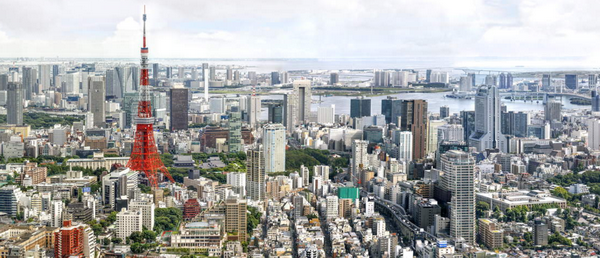
Japan's population is 127 million people, three times more than in Ukraine. The population density in Japan is 346 persons per 1 sq. km, about 3.5 times more than in Ukraine (75.5 persons per 1 sq. km). Ethnic Japanese people make up 99.4 % of the population. Life expectancy in Japan is the biggest in the world — 82.2 years (for comparison: in the US — 78.1, in Russia — 69.8, in Ukraine — 68.1). The Japanese are very industrious. They can work for 17 hours a day without interruption, while still having a no more than 4-5 days rest leave annually. Japan has 18 Nobel Prize winners.
Japan's GDP (by purchasing power parity) as of 2015 amounted to 4.6 trillion US dollars (4th place in the world) — 1.2 trillion US dollars more than in giant Russia (7th place in the world). Tokyo is the most expensive city to live in the world. The capital city has the most developed system of metro branches in the world.
Political Relations
To some extent, the Ukrainian-Japanese relations are also unique. Despite the fact that the distance between Kyiv and Tokyo is approximately 8,200 km in a straight line, we have every reason to call the relationship between Ukraine and Japan friendly and extremely promising. The identity of the approaches on many important international issues, the absence of any political problems in bilateral relations form the basis of further development of mutually beneficial relations between Ukraine and Japan in the political, economic and humanitarian spheres. Ukraine and Japan are “akin” in two similar problems — Russia's occupation of Ukrainian and Japanese territories, in Ukraine — the Crimea and part of the Donbas, in Japan — four South Kuril Islands. Obviously, this is why immediately after the illegal annexation of the Crimea by Russia, Tokyo supported Kyiv and joined all Western sanctions against Russia. Both countries have experienced catastrophes at their nuclear power plants. In April 2016, there will be 5 years from the date of the accident at the nuclear power plant “Fukushima-1” and the 30th anniversary of the Chernobyl disaster.
Japan was one of the first in the world to recognize the independence of Ukraine December 28, 1991 and established diplomatic relations with our country January 26, 1992. Since the establishment of diplomatic relations between Ukraine and Japan, 48 bilateral documents have been signed. Japan's Embassy in Ukraine was opened in January 1993, and the Embassy of Ukraine in Japan — in September 1994, M. Kulinych (02.2007 — 02.2013) served the longest as the Ambassador of Ukraine in Japan and in his time the Ukrainian-Japanese relations acquired a special dynamism. Since the autumn of 2015, M. Kulinych has been successfully working as the Ambassador of Ukraine to Australia.
Prior to P. Poroshenko's visit to Japan in early April 2016, Japan had been visited by three of his predecessors: L. Kuchma in March 1995, V. Yushchenko in July 2005, and V. Yanukovych in January 2011. During those visits, political foundations of cooperation between Ukraine and Japan were established, which brought the whole complex of bilateral Ukrainian-Japanese relations to a qualitatively new level of partnership.
As a result of the visits, the sides signed the following documents: during L. Kuchma's visit — a Joint Declaration on Partnership between Ukraine and Japan was signed, during V. Yushchenko's visit — a Joint Statement on a New Partnership for the 21st Century, during V. Yanukovych's visit — a Joint Statement on Ukraine-Japan Global Partnership. These documents determined the main directions, forms and mechanisms of cooperation between Ukraine and Japan on a wide range of bilateral and international issues. These documents determined the priorities of bilateral cooperation and the programs of implementation of the main tasks for the short term and medium term future.
During the 25 years of diplomatic relations between the countries extremely active have been bilateral contacts at parliamentary level. The heads of the Ukrainian and Japanese parliaments and MPs over the years have made dozens of mutual visits. The Chairman of the Verkhovna Rada of Ukraine V. Lytvyn visited Japan twice — in May 2003 and in March 2012, the first and only visit to Japan at the level of Prime Minister was Y. Tymoshenko's visit in March 2009. Almost every year, there were visits by Foreign Ministers of Ukraine and Japan and their deputies. Thus, during the quarter-century between Kyiv and Tokyo there have been a quite active political dialogue, which is the basis of cooperation between the two countries in trade, economic, scientific-technical, cultural and humanitarian spheres.
In May 2006, in Kyiv on the basis of the National Technical University of Ukraine, “Ukraine-Japan Center” (UAJC — http://uajc.com.ua/) began to work. The task of the Center is to deepen the understanding and to improve friendly relations between the two countries.
During Russia's military aggression against Ukraine, Japan's assistance has become an important factor in support of the sovereignty and defence of Ukraine. March 24, 2014 in the midst of the Russian aggression in the Crimea, the Japanese government announced the allocation of financial assistance to Ukraine in the amount of 1.5 billion US dollars. April 25, 2014, Japan announced the allocation of 800 thousand Euros to support the democratization processes in Ukraine through the OSCE and the Council of Europe. Besides, Japan has provided Ukraine with about 525 thousand US dollars humanitarian aid for internally displaced persons. In October 2014 during the Milan Summit of leaders of EU countries and Asia (ASEM), the Japanese Prime Minister during the meeting with President P. Poroshenko confirmed the provision of Japan's additional assistance to Ukraine (in the amount of 13.6 million US dollars) to restore the destroyed infrastructure of the Donbas. The list of the amounts of Japan's humanitarian aid to Ukraine is not limited to this, but includes some more million dollars.
Economic Cooperation
In 2015, Japan got the fourth place among the trade partners of Ukraine in the Asia-Pacific region. In 2015, the bilateral trade between Ukraine and Japan amounted to 617.8 million US dollars, having decreased in comparison with 2014 by 24.9 %. (For comparison: in 2013 the Ukrainian-Japanese trade amounted to 1 billion 466 million US dollars). At this, the export of goods from Ukraine to Japan amounted to 235.6 million US dollars, having increased by 12.4 %, and imports of Japanese goods into Ukraine amounted to 382.2 million US dollars, having decreased by 37.6 %. The structure of Ukrainian exports to Japan during this period was dominated by supplies of cereals (40.9 %), tobacco (24.1 %), ores, slag and ash (23.4 %), aluminum and articles thereof (5.2 %). More than 50 % of Japanese imports to Ukraine are production of high-tech industries, including car engineering — passenger cars and other vehicles, as well as the tires and transformers.
Japan's direct investments into Ukraine are about 200 million US dollars. Taking into account direct investments of affiliates of Japanese corporations located in Europe, the Japanese investments in the Ukrainian economy make up to 300 million US dollars. The largest volume of Japanese investments was brought into the sphere of trade, repair of motor vehicles (60%) and into the processing industry (35%). Major Japanese business structures, working in Ukraine, are “Sumitomo”, “Itochu”, “Mitsui”, “Marubeni”, “Mitsubishi”, “Sojitz”.
As a co-financing within the framework of the “Loan for the Development Policy” joint project with the World Bank at present, the total assistance to Ukraine from Japan is 1.8 billion US dollars, of which 1.1 billion US dollars will be used to reconstruct Bortnychi Aeration Plant in Kyiv. The total package of Japan's aid (18 billion US dollars) to Ukraine is the largest among all countries in the world. In August 2014, the Government of Ukraine received a loan from the Japan International Cooperation Agency in the amount of 100 million US dollars. Japanese companies are willing to provide a grant of 60 million US dollars for modernization of turbines of the Tripillya and Zmiev TPP, which are part of the state-owned company “Centrenergo”, which is subject to privatization. These Japanese companies are also ready to participate in tenders for the construction of hydroelectric power plants in Ukraine.
Taking into consideration Japan's high solvency, which 60 % dependent on food imports, its market is extremely promising for Ukrainian agricultural producers. In recent years, Ukraine annually supplied Japan with grain (330 million US dollars), which makes more than 70 % of total Ukrainian exports to that country. In 2015, the share of export of Ukrainian grain crops into Japan doubled to 148 million US dollars. This is despite Russia's de facto ban on the transit of Ukrainian products into the countries of the Asia-Pacific region. It is expected that in 2016 the export of Ukrainian agricultural products to Japan can reach 1 billion US dollars. At present, the Governments of Ukraine and Japan are considering the implementation of projects in the sphere of improving the material and technical basis of Ukrainian agricultural enterprises, including logistics, elevator management and export terminals by bringing in Japanese technologies and investments with a view to increasing exports of agricultural products to Japan.
Ukraine was the first partner of Japan in Europe in the implementation of the Kyoto Protocol. March 18, 2009 the governments of Ukraine and Japan signed an agreement to acquire assigned amount of units by the green investment scheme between the National Environmental Investment Agency of Ukraine and the New EnergyandIndustrial Technology Development Organization(NEDO). The result of this cooperation was the consistent provision in 2014 of Japan's concessional loan of 1.1 billion US dollars for 40 years with a ten-year grace period under 0.1 % per annum for the KCSA under the project of reconstruction of the aeration station “Bortnychi” in Kyiv.
The development of mutual trade is contributed to by the Coordinating Council for Economic Cooperation with Japan at the Ministry of Economic Development of Ukraine and the Committee on Business Cooperation with Ukraine of the Japanese Business Federation “Keidanren”. The latest (5th) meeting of the Coordinating Council was held October 1, 2014 in Kyiv. In the autumn of 2016 in Tokyo is scheduled to be held the next meeting of the Coordinating Council.
In 2007, a new format was found for the Ukrainian-Japanese cooperation “GUAM — Japan”. The official Tokyo considers GUAM a “new frontier of the Japanese diplomacy”. Currently, there have already been six meetings in this format, the latest — in March 2012, at the Ukrainian Embassy in Tokyo. Cooperation in the format “GUAM — Japan” is of interest for the Japanese side in the field of tourism, exchanges of experience on the prevention of emergency situations and elimination of their consequences, ensuring energy security, improving the infrastructure of the GUAM transport corridor. In other words, Japan considers GUAM an element of the Japanese “Silk Road” to Europe.
The Main Results of P. Poroshenko's Visit to Japan
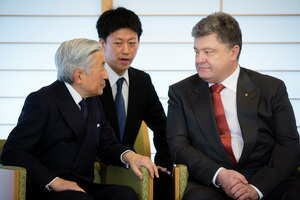 During his official visit to Japan, President of Ukraine Petro Poroshenko and his wife Maryna Poroshenko met with Their Majesties Emperor Akihito and Empress Michiko. The Head of our State expressed his gratitude to Japan for its political support and solidarity with Ukraine in combating external aggression, as well as for a large-scale financial assistance. The Ukrainian President invited Emperor Akihito to visit Ukraine on an official visit at a convenient time for him.
During his official visit to Japan, President of Ukraine Petro Poroshenko and his wife Maryna Poroshenko met with Their Majesties Emperor Akihito and Empress Michiko. The Head of our State expressed his gratitude to Japan for its political support and solidarity with Ukraine in combating external aggression, as well as for a large-scale financial assistance. The Ukrainian President invited Emperor Akihito to visit Ukraine on an official visit at a convenient time for him.
April 6, President of Ukraine held talks with Japanese Prime Minister Shinzo Abe. The parties agreed to coordinate actions within the UN Security Council, the WTO and other international organizations. P. Poroshenko reiterated the firmness of Ukraine's support to Japan in the latter's desire to become a permanent UN Security Council member.
Shinzo Abe announced about Japan's intention to grant Ukraine further 3.5 million Euros for the construction of the storage of nuclear fuel in Ukraine, and informed on the Japanese insurance company's beginning of export and import credit line for Ukraine in the amount of approximately 269 million US dollars, that will help to stabilize the economy and social situation in Ukraine.
The Ukrainian President expressed Ukraine's deep gratitude to Japan, which helped our country in overcoming the consequences of the Chernobyl catastrophe. Ukraine also was one of the first to help Japan in overcoming the consequences of the disaster at the “Fukushima-1” NPP, which took place five years ago. The sides agreed on further cooperation in the field of elimination of consequences of accidents at nuclear power plants and other man-made disasters within the framework of a special Bilateral Committee.
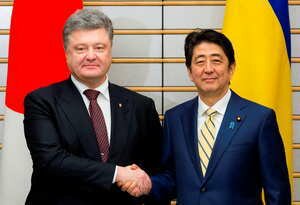 Shinzo Abe stressed his country's interest to develop relations with Ukraine. “We have common core values — such as freedom, democracy, human rights and the rule of law”, said the Head of the Government of Japan. The parties agreed to continue the implementation of joint projects first of all in the spheres of energy, infrastructure and environment. Special attention was paid to the agricultural sector and the development of cooperation in this direction.
Shinzo Abe stressed his country's interest to develop relations with Ukraine. “We have common core values — such as freedom, democracy, human rights and the rule of law”, said the Head of the Government of Japan. The parties agreed to continue the implementation of joint projects first of all in the spheres of energy, infrastructure and environment. Special attention was paid to the agricultural sector and the development of cooperation in this direction.
P. Poroshenko expressed hope that at the upcoming G-7 Summit in Japan on May 26-27, 2016, world leaders would reaffirm their support for Ukraine by sending a powerful message to the Kremlin. The decision of the “Big Seven” on this issue on the eve of the EU summit will largely determine the maintaining of sanctions against Russia, as the G-7 includes four major European countries: Germany, Great Britain, Italy and France.
As it became known, on April 10 Foreign Ministers of the Group of Seven (G7) met in Hiroshima, Japan, to discuss important international issues that will be on the agenda during the Summit of the G7 leaders. The list of these issues includes nuclear disarmament, measures to combat terrorism, safety of maritime navigation, as well as the situation in Ukraine, in the Middle East and in North Korea. On the eve of the meeting of Foreign Ministers of G7 in Hiroshima, Foreign Minister of Germany Frank-Walter Steinmeier expressed his hope that G7 format does not remain for a long time, but that the conditions will have been created to return to the G8 — a political solution to the armed conflict in Ukraine and the ongoing “Russia' constructive role” in the issue of the peaceful settlement in Syria. However, according to him, this year there are no conditions for the return to the G8 format.
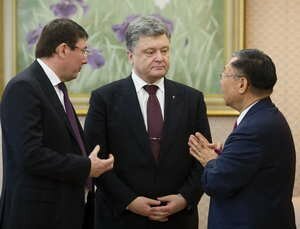 During the meeting with the Speaker of the House of Representatives of the Parliament of Japan Tadamori Oshima, the President of Ukraine thanked the Japanese people for their support for the territorial integrity and sovereignty of Ukraine and the introduction of Japan's sanctions against Russia, which has carried out aggression against Ukraine. The Ukrainian President also thanked the Japanese government for a large-scale assistance given to Ukraine to overcome the consequences of Russia's aggression in the Donbas and to strengthen democratic institutions, and to carry out economic reforms. Tadamori Oshima pointed out the intensity of the Ukrainian-Japanese inter-parliamentary contacts.
During the meeting with the Speaker of the House of Representatives of the Parliament of Japan Tadamori Oshima, the President of Ukraine thanked the Japanese people for their support for the territorial integrity and sovereignty of Ukraine and the introduction of Japan's sanctions against Russia, which has carried out aggression against Ukraine. The Ukrainian President also thanked the Japanese government for a large-scale assistance given to Ukraine to overcome the consequences of Russia's aggression in the Donbas and to strengthen democratic institutions, and to carry out economic reforms. Tadamori Oshima pointed out the intensity of the Ukrainian-Japanese inter-parliamentary contacts.
The interlocutors stressed the readiness for further development of inter-parliamentary cooperation between the two countries. The meeting was attended by Chairman of the Parliamentary faction of BPP Yu. Lutsenko.
During the meeting with the representatives of “Keidanren” (Japanese Business Federation), our President invited Japanese companies to invest in Ukraine and to take part in privatization of Ukrainian ports and energy facilities. The Head of the State said that in 2015 Ukrainian exports to Japan grew by 12 %. P. Poroshenko called on Japanese businessmen to take full advantage of the opportunities offered by introduction of a Free Trade Area between Ukraine and the EU. “Ukraine could become a new gateway for Japanese investments in Europe”, stressed the President. The Head of the Ukrainian State added that Japanese businesses would be able to get an opportunity to sell into the EU almost duty free the goods produced in Ukraine.
During P. Poroshenko's meeting with Japanese businessmen, they discussed ways to intensify the trade and economic cooperation between the two countries and to increase the volume of Japanese investments into the Ukrainian economy. Important agreements were reached on the implementation of joint projects in the spheres of energy engineering, infrastructure and in agricultural sector.
As part of the Ukrainian President's visit, Ukrainian specialists of Minekonomtorg met with the leaders of the Japan External Trade Organization (JETRO), discussed the issues of cooperation in the fields of engineering, aerospace, IT, light industry and agricultural sector. The parties agreed to study the question of opening JETRO's office in Ukraine, and to combine efforts to increase Ukrainian exports to Japan. An agreement was also reached on the cooperation of the Ukrainian structures with the Japan International Cooperation Agency (JICA). The parties agreed to hold September 7-8 in Tokyo the Japanese-Ukrainian Agrarian Congress.
The President of Ukraine also thanked the Japanese corporation “Fujikura” for investments in Ukraine (“Fujikura” is mainly engaged in producing cable networks for leading European automotive companies). Currently, “Fujikura” is building in the industrial park in Lviv “Ryasna-2” a complex for production of automotive electrical components with the area of 11,600 square meters. Over the next three years, the company will employ more than 3,000 workers. Construction of the plant will last for one and a half year, investments will amount to 75 million US dollars. In his speech at the meeting, the President of “Fujikura” Masahiko Ito encouraged other Japanese companies to invest in Ukraine and to take advantage of the competitive advantages of our country's market.
P. Poroshenko pointed out that Ukraine is doing everything to improve the investment climate, and stressed that the activities of Japanese companies in the Ukrainian market will be helped by the bilateral agreement on the promotion and mutual protection of investments, which came into force in November 2015. During the negotiations, P. Poroshenko and Shinzo Abe reached an agreement on visa liberalization first for holders of diplomatic passports and, later, to all citizens of Ukraine with the prospect of introduction of a visa-free regime.
* * *
The official visit of the President of Ukraine P. Poroshenko to Japan was an important step towards further development of friendly relations and mutually beneficial Ukrainian-Japanese cooperation in political, economic, cultural and humanitarian spheres. The visit focused on three areas of bilateral relations: strengthening political cooperation, trade and economic, scientific-technical, cultural and humanitarian cooperation between the two countries; lobbying interests of Ukraine at the next summit of the “Big Seven”, which will be held in late May this year in Tokyo; cooperation in the sphere of international security, in particular regarding the situation in the occupied Crimea and Donbas.
A friend in need is a friend indeed. And today we can say that although Japan is far away from Ukraine, but more than any other country in the world, it provides us with the most important friendly support and assistance, adds to our strength and inspiration to fight for a better future of Ukraine. Japan is our close friend and reliable partner. As long as we have such friends — we are invincible. And we must do everything possible to ensure that we have more friends like Japan.

